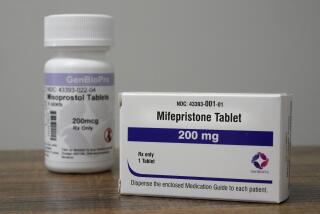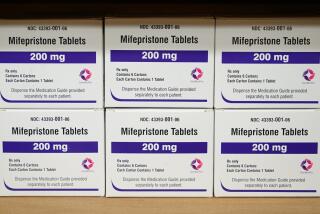White House rejects wider access to morning-after pill
The Obama administration, in an unexpected move, overruled a Food and Drug Administration decision that would have allowed anyone, regardless of age, to buy emergency contraceptives without a prescription.
The pill, called Plan B One-Step, currently is available to women 17 and older without a doctor’s order, though it is kept behind the counter. Teva Pharmaceutical Industries asked the FDA to make the drug available to those 16 and younger without a prescription.
When taken within 72 hours of unprotected sex, the pill is effective in preventing pregnancy by restricting ovulation or blocking the implantation of a fertilized egg.
Health and Human Services Secretary Kathleen Sebelius said in a statement that she was rejecting the company’s request because Teva hadn’t proved that girls as young as 11 would be able to use Plan B safely. An FDA spokeswoman said it was the first time that the Health and Human Services Department had used its statutory authority to overrule an agency decision.
The move stunned pro-choice advocates. “The decision is a huge step back,” said Dr. Susan Wood, a former FDA assistant commissioner for women’s health. She criticized the administration for “abandoning its scientific integrity principles, and blocking a safe and effective contraceptive.”
Also denouncing the decision were groups representing pediatricians, obstetrician-gynecologists and other physicians involved in adolescent health.
David Kessler, FDA commissioner during the George H.W. Bush and Bill Clinton administrations, called the department’s overruling of the FDA “an extraordinary event” and not normally what “we aspire to.” He added, however, that it was good that the disagreement was “transparent.”
Antiabortion groups were delighted by the decision. “It would be outrageous to put a drug like Plan B on the shelf next to condoms,” said Rita Diller, head of the American Life League’s Stop Planned Parenthood project. “It’s not meant to be ongoing birth control, and that’s how they would use it if it was available like condoms.”
FDA Commissioner Margaret Hamburg said in a statement that she agreed with her agency’s staffers that there was adequate “science-based evidence that Plan B One-Step is safe and effective and should be approved for nonprescription use for all females of childbearing potential.”
But she said she was informed Wednesday that Sebelius disagreed with the FDA’s conclusion and was invoking her authority to overrule the agency.
Sebelius, in her statement, said Teva’s “label comprehension and actual use studies did not contain data for all ages for which this product would be available for use.” Teva said it was disappointed by the decision.
While angering pro-choice groups, the action probably averted a firestorm that could have been touched off if Plan B was made more widely available. Obama’s reelection formula depends on winning swing states where white working-class and Catholic voters will play a key role.
Administration officials said the decision was based on the merits and that Sebelius wanted to see more data before approving easier access to the drug.
Lanae Erickson, director of the social policy and politics program at Third Way, a centrist think tank, said Sebelius was taking a nuanced approach to a complicated issue. “We need to be sure teens are using the drug effectively and safely, because it has higher hormone levels than other contraceptives,” she said.
But Wood, who left the FDA in 2005 in protest over the agency’s foot-dragging in approving the drug’s original over-the-counter application, said the FDA, not Sebelius, has the expertise to analyze the data. She said the secretary was holding Plan B to a higher standard than other drugs sold without a prescription.
“The FDA has never asked for age-specific data on any of its over-the-counter products,” said Wood, who teaches at George Washington University’s School of Public Health. “So what we have is a very safe product.…You cannot overdose” — a risk, she said, that exists with other widely used drugs such as acetaminophen.
While supporting abortion rights and women’s access to contraceptives, the Obama administration has consistently sought to avoid public debates over politically explosive issues involving reproductive rights.
A month after Obama took office in 2009, for example, the White House made no official announcement when the president scaled back rules, dating from his predecessor, that allowed healthcare workers to deny abortion counseling or other family planning services if doing so would violate their moral beliefs.
The wrangling over the availability of emergency contraceptives has been going on for more than a decade. The first version of Plan B was approved for prescription use in 1999. Under the George W. Bush administration, the FDA delayed a request to switch the drug to over-the-counter status for three years; it finally did so in 2006, but only for women 18 and older.
In 2009, a federal judge found the agency’s 2006 decision to require prescriptions for younger teens “arbitrary and capricious” and driven by political considerations. A newer version of the drug, Plan B One-Step, was approved by the FDA later that year, but required prescriptions for females 16 and younger.
Noam N. Levey and Christi Parsons in the Washington bureau contributed to this report.
More to Read
Start your day right
Sign up for Essential California for news, features and recommendations from the L.A. Times and beyond in your inbox six days a week.
You may occasionally receive promotional content from the Los Angeles Times.







